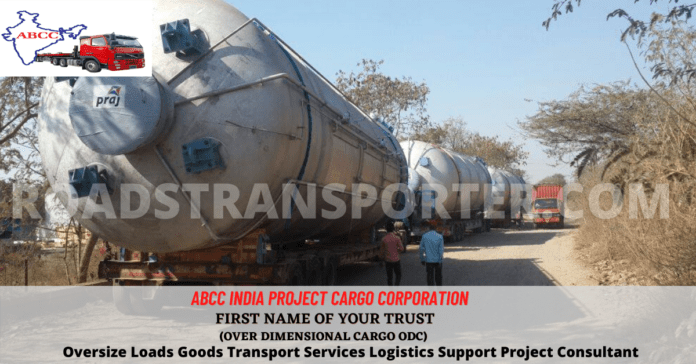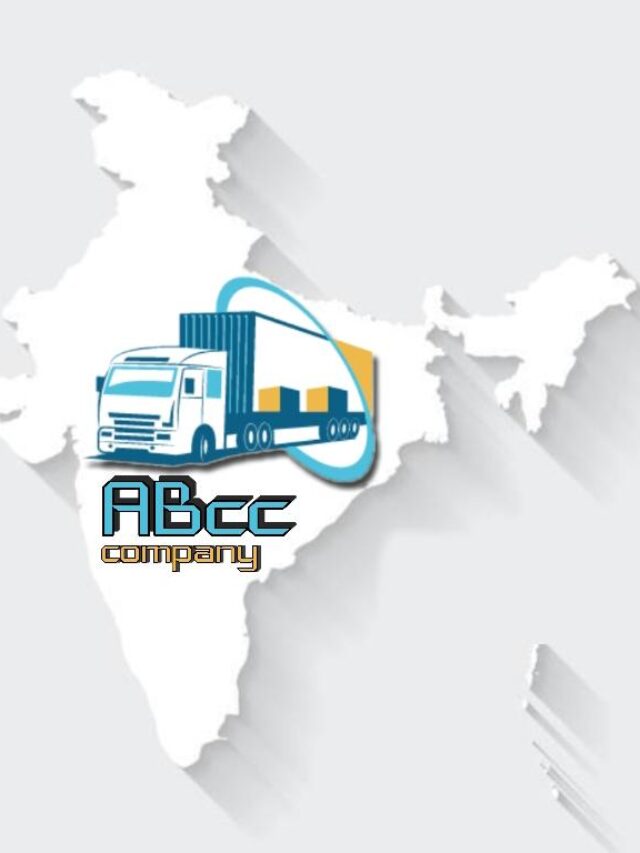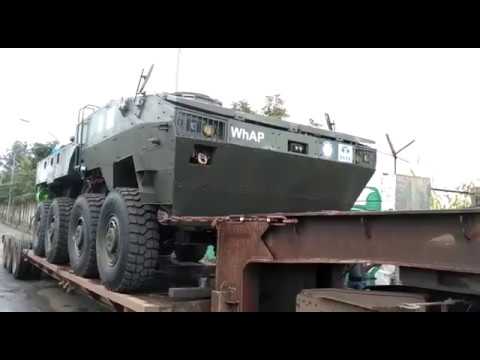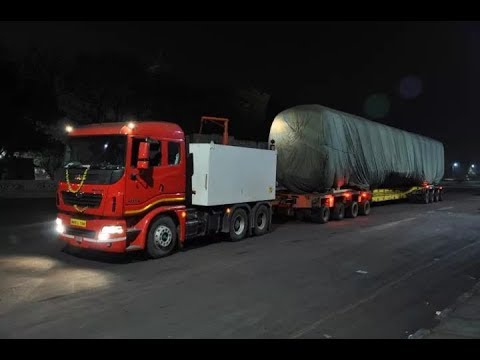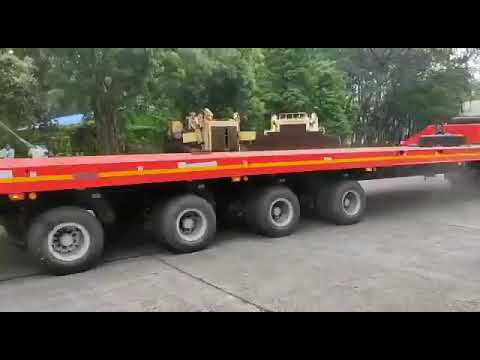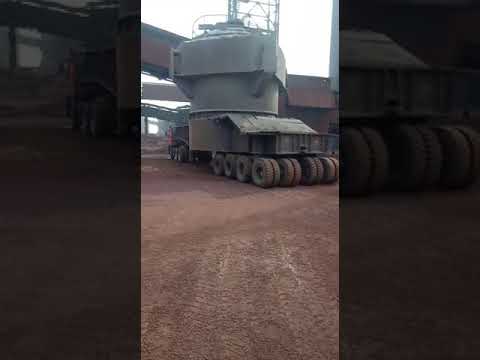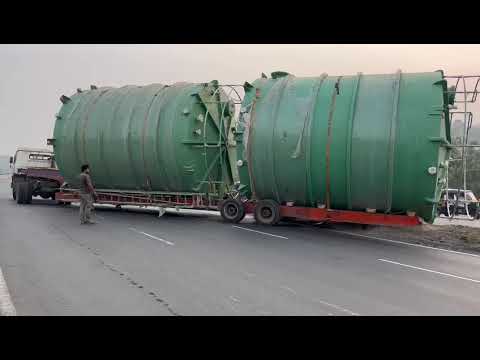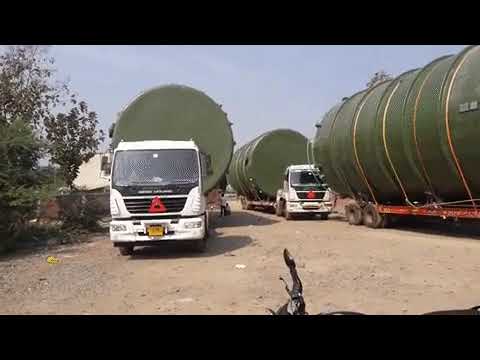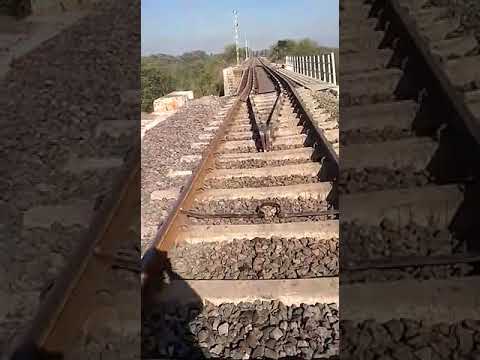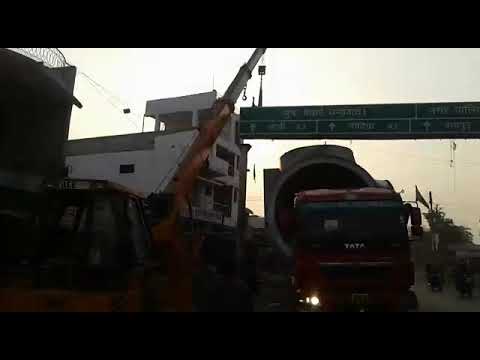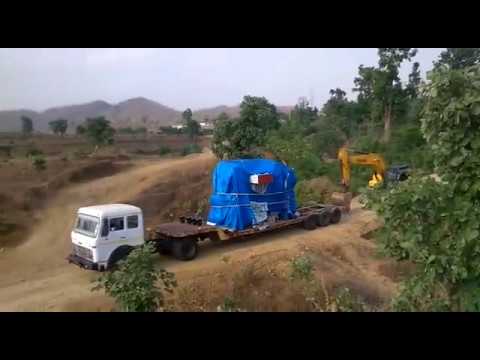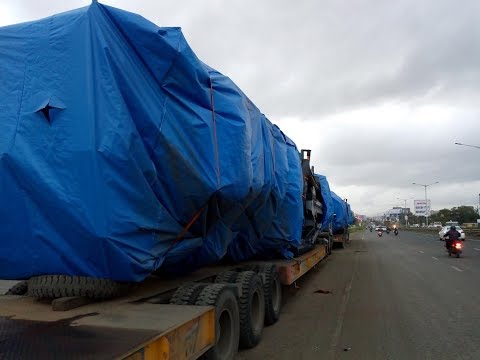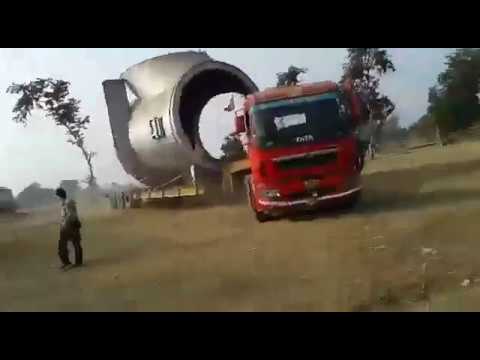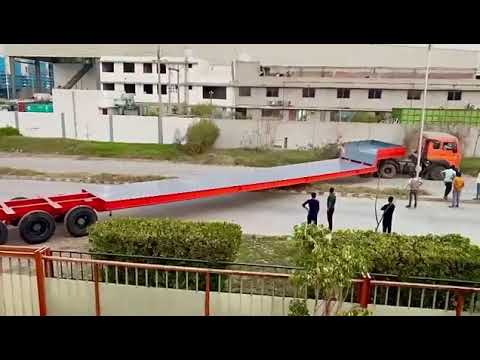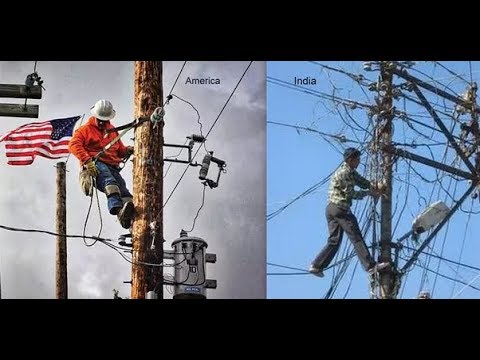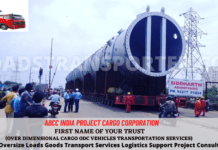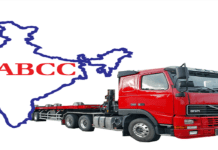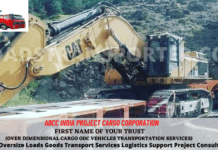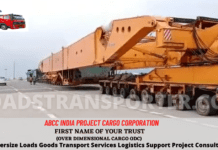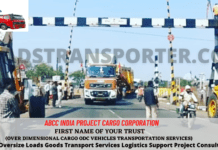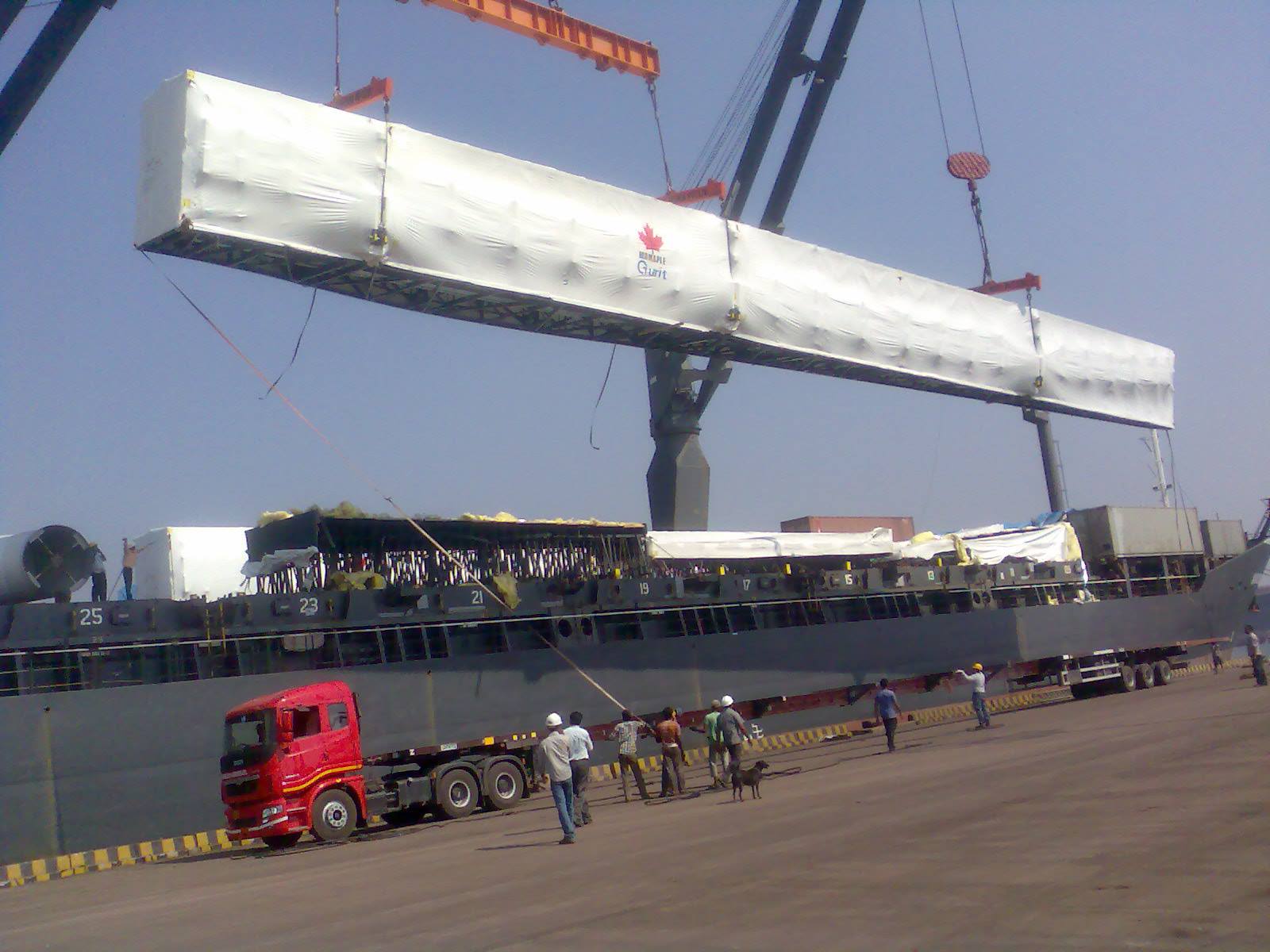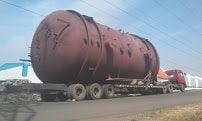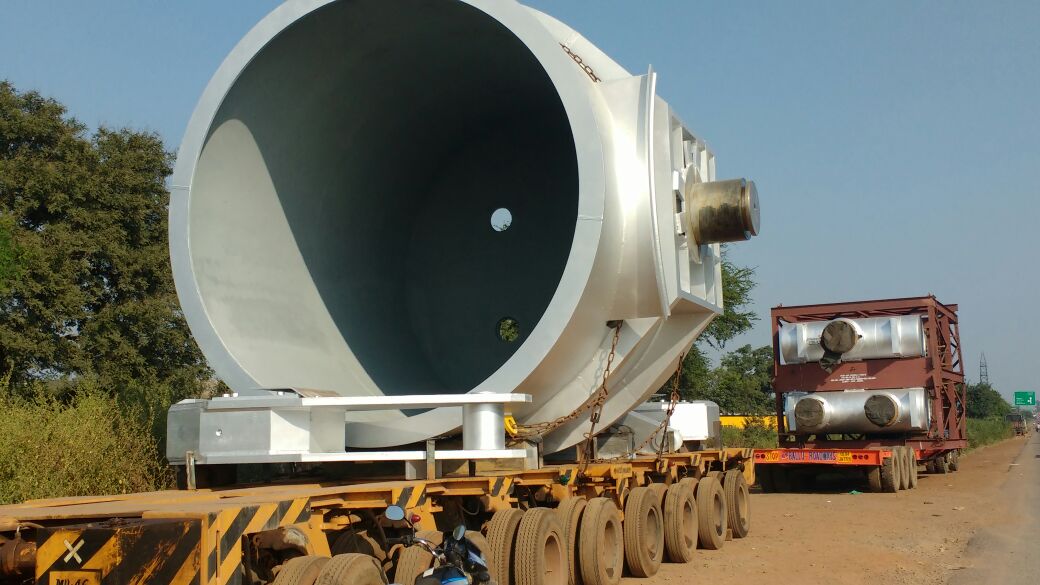What is low bed trailer?
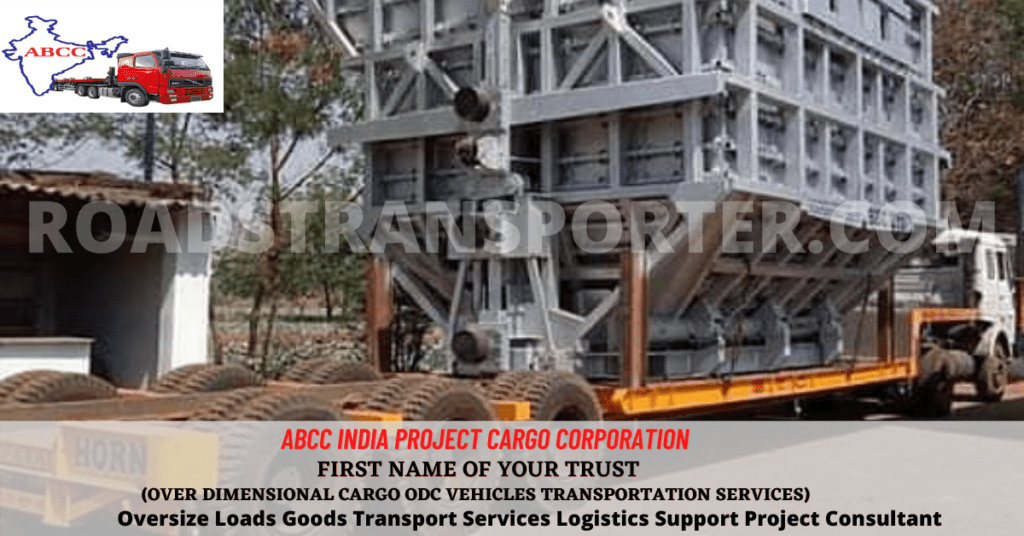
A low bed trailer is a type of trailer that is designed to transport heavy loads. It has a lower loading platform than a traditional trailer, which allows for the transportation of loads that are too tall to fit on a standard trailer. Low bed trailers are typically used to transport heavy equipment such as tractors, bulldozers, excavators, and wind turbines.
Low bed trailers come in a variety of sizes, but they typically have a loading platform that is around 25 feet long and 8.5 feet wide. The payload capacity of a low bed trailer can vary depending on the size and construction of the trailer, but they can typically carry loads of up to 60 tons.
Low bed trailers are typically pulled by a semi-trailer truck. The truck is equipped with a gooseneck, which is a pivoting coupler that attaches to the front of the trailer. The gooseneck allows the trailer to be maneuvered easily, even when it is carrying a heavy load.
Low bed trailers are an essential part of the transportation industry. They allow for the safe and efficient transportation of heavy loads, which is essential for many businesses and industries.
Here are some of the benefits of using a low bed trailer:
- They can transport loads that are too tall to fit on a standard trailer.
- They have a high payload capacity.
- They are relatively easy to maneuver.
- They are a safe way to transport heavy loads.
Here are some of the limitations of using a low bed trailer:
- They are larger and heavier than standard trailers.
- They require a special type of truck to pull them.
- They can be more expensive than standard trailers.
Overall, low bed trailers are a versatile and effective way to transport heavy loads. They are used by a wide variety of businesses and industries, and they offer a number of benefits over traditional trailers.
Why Required lowbed trailer?
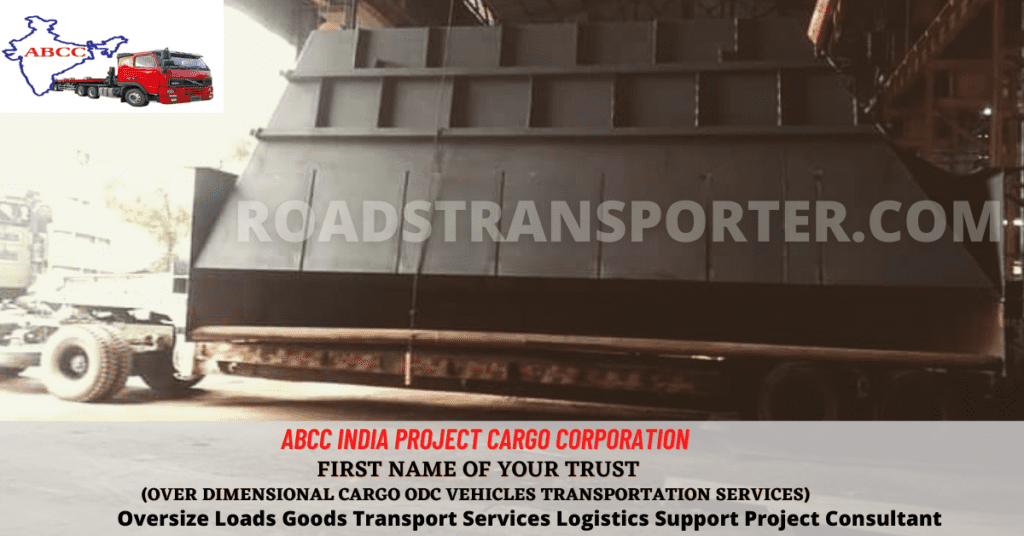
There are a few reasons why a lowbed trailer might be required.
- To transport loads that are too tall to fit on a standard trailer. Lowbed trailers have a lower loading platform than a traditional trailer, which allows for the transportation of loads that are too tall to fit on a standard trailer. This includes things like large construction equipment, wind turbines, and even airplanes.
- To transport loads that are very heavy. Lowbed trailers have a high payload capacity, which means they can carry very heavy loads. This makes them ideal for transporting things like tanks, armored vehicles, and other military equipment.
- To transport loads that are sensitive to ground clearance. Some loads, such as wind turbines, are sensitive to ground clearance. This means that they need to be transported on a trailer that has a low loading platform. Lowbed trailers are ideal for this type of load because they have a very low loading platform.
In addition to these reasons, lowbed trailers are also sometimes used for other purposes, such as:
- To transport loads that are too wide to fit on a standard trailer. Lowbed trailers can be widened to accommodate loads that are too wide to fit on a standard trailer.
- To transport loads that are being transported over rough terrain. Lowbed trailers have a lower center of gravity than a standard trailer, which makes them more stable when traveling over rough terrain.
Overall, lowbed trailers are a versatile and effective way to transport heavy loads. They are used by a wide variety of businesses and industries, and they offer a number of benefits over traditional trailers.
What are the benefits of a low bed trailer?
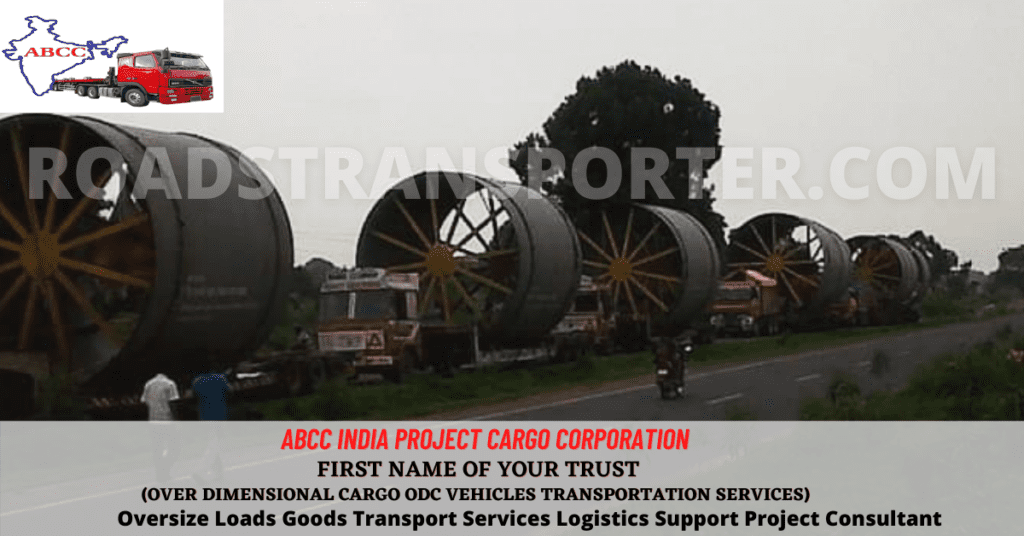
Low bed trailers offer a number of benefits over traditional trailers, including:
- Ability to transport loads that are too tall to fit on a standard trailer. Low bed trailers have a lower loading platform than a traditional trailer, which allows for the transportation of loads that are too tall to fit on a standard trailer. This includes things like large construction equipment, wind turbines, and even airplanes.
- High payload capacity. Low bed trailers have a high payload capacity, which means they can carry very heavy loads. This makes them ideal for transporting things like tanks, armored vehicles, and other military equipment.
- Lower center of gravity. Low bed trailers have a lower center of gravity than a standard trailer, which makes them more stable when traveling over rough terrain. This is especially important when transporting heavy loads.
- Relatively easy to maneuver. Low bed trailers are relatively easy to maneuver, even when they are carrying a heavy load. This is because the gooseneck coupler allows the trailer to be pivoted, which makes it easier to turn corners.
- Safe way to transport heavy loads. Low bed trailers are a safe way to transport heavy loads. This is because they are designed to be very stable, even when they are carrying a heavy load.
Overall, low bed trailers are a versatile and effective way to transport heavy loads. They are used by a wide variety of businesses and industries, and they offer a number of benefits over traditional trailers.
Here are some of the limitations of using a low bed trailer:
- They are larger and heavier than standard trailers. This can make them more difficult to transport and maneuver.
- They require a special type of truck to pull them. This can make them more expensive to use.
- They can be more expensive than standard trailers. This is because they are more complex to build and require more materials.
Despite these limitations, low bed trailers are a valuable tool for businesses and industries that need to transport heavy loads. They offer a number of benefits over traditional trailers, and they are a safe and efficient way to transport heavy loads.
What is the purpose of low bed?
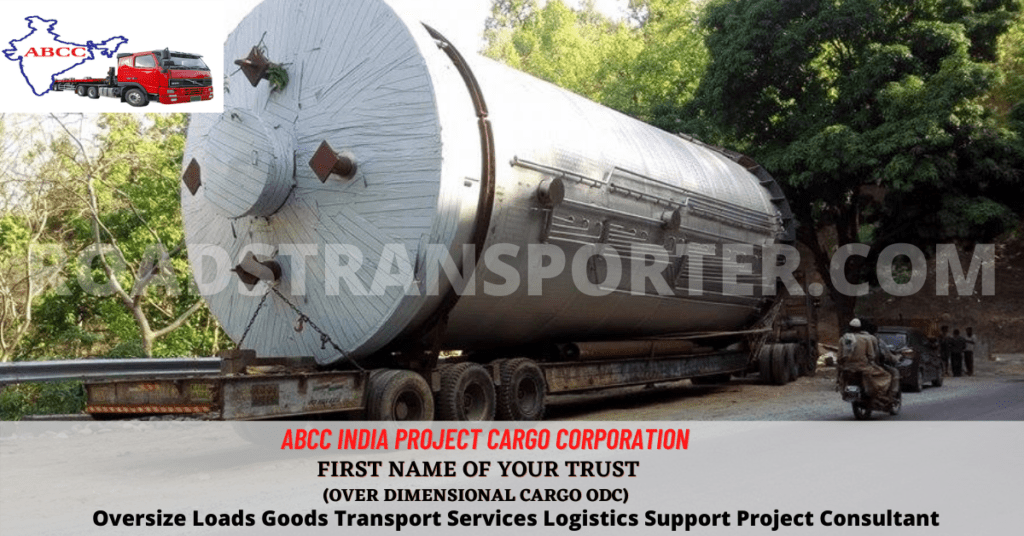
The purpose of a low bed trailer, also known as a lowboy trailer, is to transport heavy and oversized cargo, machinery, and equipment that cannot be accommodated by standard trailers due to their size or weight. By having a lower deck height, the low bed trailer provides the following benefits and fulfills specific purposes:
- Transporting tall and large items: Low bed trailers are designed with a lower deck height, which allows them to transport high-profile cargo that exceeds the legal height limits for regular trailers. This includes tall construction equipment, industrial machinery, and large vehicles.
- Load stability: The lower center of gravity offered by the low bed design enhances load stability during transportation. This feature is crucial when carrying heavy and bulky items to ensure a safe and balanced journey.
- Heavy cargo capacity: Low bed trailers are built to withstand and distribute the weight of heavy loads effectively. Their robust construction and specialized axle configurations allow them to handle substantial weight without compromising safety.
- Easy loading and unloading: The low deck height makes it easier to load and unload cargo, especially when using equipment like cranes, forklifts, or ramps. This feature streamlines the logistics process and reduces the time and effort required for loading and unloading operations.
- Versatility: Due to their ability to transport a wide range of heavy and oversized cargo, low bed trailers are widely used in various industries such as construction, mining, energy, agriculture, and infrastructure development.
- Compliance with regulations: Low bed trailers are designed to comply with transportation regulations regarding height and weight restrictions for oversized cargo. They enable the transportation of large equipment and machinery while adhering to legal requirements.
In summary, the purpose of low bed trailers is to provide a specialized solution for transporting heavy, tall, and oversized cargo safely and efficiently, meeting the unique transportation needs of certain industries and projects.
What is the difference between a lowbed and trailer?
The main difference between a lowbed and a trailer is the height of the loading platform. A lowbed trailer has a much lower loading platform than a standard trailer, which allows for the transportation of loads that are too tall to fit on a standard trailer.
Here is a table that summarizes the key differences between lowbeds and trailers:
| Feature | Lowbed | Trailer |
|---|---|---|
| Loading platform height | Lower | Higher |
| Payload capacity | Higher | Lower |
| Stability | More stable | Less stable |
| Maneuverability | Less maneuverable | More maneuverable |
| Cost | More expensive | Less expensive |
Lowbeds are typically used to transport heavy equipment such as tractors, bulldozers, excavators, and wind turbines. Trailers are more commonly used to transport a wider variety of loads, such as cars, trucks, and boats.
Here are some examples of lowbeds:
- Drop deck trailer: This type of lowbed has a drop-down section in the center of the loading platform, which allows for even lower loading heights.
- Extendable lowbed: This type of lowbed can be extended to accommodate longer loads.
- Modular lowbed: This type of lowbed is made up of several smaller sections that can be combined to create a trailer of any length or width.
Here are some examples of trailers:
- Flatbed trailer: This type of trailer has a flat loading platform that is used to transport a wide variety of loads.
- Enclosed trailer: This type of trailer has a roof and sides that protect the load from the elements.
- Reefer trailer: This type of trailer has a refrigeration unit that keeps the load at a constant temperature.
The term “lowbed” is often used interchangeably with “trailer,” but there is a distinct difference between the two:
- Trailer: A trailer is a general term used to describe a non-motorized vehicle that is towed by a powered vehicle, such as a truck or a tractor. It is designed to carry cargo and goods and can come in various types and configurations, including flatbed trailers, box trailers, refrigerated trailers, and more. Trailers are widely used in transportation for a wide range of purposes, from hauling consumer goods to industrial equipment.
- Lowbed Trailer (Lowboy Trailer): A lowbed trailer, also known as a lowboy trailer, is a specific type of trailer designed to transport heavy and oversized cargo. It has a lower deck height compared to standard trailers, allowing it to carry tall and large items that cannot fit within the legal height limits of regular trailers. Lowbed trailers are commonly used in industries such as construction, mining, agriculture, and transportation of heavy industrial equipment, like bulldozers, excavators, cranes, and wind turbine components.
In summary, the key difference between a lowbed trailer and a trailer lies in their specific design and intended use. While a trailer is a broad term encompassing various types of non-motorized vehicles used for cargo transportation, a lowbed trailer refers to a specialized trailer with a lower deck height, specifically designed for transporting heavy and oversized items. The lowbed trailer is just one type of trailer among many others available for different transportation purposes.
What’s the difference between flatbed and lowbed?
Flatbeds and lowbeds are both types of trailers that are used to transport heavy loads. However, there are some key differences between the two types of trailers.
Flatbeds have a flat loading platform that is the same height throughout. This makes them versatile and can be used to transport a wide variety of loads. However, flatbeds are not as stable as lowbeds when transporting tall loads.
Lowbeds have a lower loading platform in the middle than at the front and rear. This allows them to transport loads that are too tall to fit on a standard flatbed. Lowbeds are also more stable than flatbeds when transporting tall loads.
Here is a table that summarizes the key differences between flatbeds and lowbeds:
| Feature | Flatbed | Lowbed |
|---|---|---|
| Loading platform height | Uniform | Lower in the middle |
| Payload capacity | Lower | Higher |
| Stability | Less stable | More stable |
| Maneuverability | More maneuverable | Less maneuverable |
| Cost | Less expensive | More expensive |
Here are some examples of how flatbeds and lowbeds are used:
- Flatbeds: Flatbeds are commonly used to transport construction equipment, such as excavators and bulldozers. They are also used to transport cars, trucks, and boats.
- Lowbeds: Lowbeds are commonly used to transport wind turbines and other heavy equipment that is too tall to fit on a standard flatbed. They are also used to transport military vehicles.
What’s the difference between semibed and lowbed?
Semibeds and lowbeds are both types of trailers that are used to transport heavy loads. However, there are some key differences between the two types of trailers.
Semibeds are a type of flatbed trailer that is attached to a semi-trailer truck. This makes them more maneuverable than lowbeds, which can be difficult to turn corners. However, semibeds are not as stable as lowbeds when transporting tall loads.
Lowbeds are a type of trailer that has a lower loading platform than a standard flatbed. This allows them to transport loads that are too tall to fit on a standard flatbed. Lowbeds are also more stable than semibeds when transporting tall loads.
Here is a table that summarizes the key differences between semibeds and lowbeds:
| Feature | Semibed | Lowbed |
|---|---|---|
| Loading platform height | Uniform | Lower in the middle |
| Payload capacity | Lower | Higher |
| Stability | Less stable | More stable |
| Maneuverability | More maneuverable | Less maneuverable |
| Cost | Less expensive | More expensive |
Here are some examples of how semibeds and lowbeds are used:
- Semibeds: Semibeds are commonly used to transport construction equipment, such as excavators and bulldozers. They are also used to transport cars, trucks, and boats.
- Lowbeds: Lowbeds are commonly used to transport wind turbines and other heavy equipment that is too tall to fit on a standard flatbed. They are also used to transport military vehicles.
In short, semibeds are more maneuverable than lowbeds, but lowbeds are more stable when transporting tall loads. The best type of trailer for a particular load will depend on the specific requirements of the load.
What’s the difference between modular hydraulic multi axle trailer and lowbed?
Modular hydraulic multi-axle trailers and lowbeds are both types of trailers that are used to transport heavy loads. However, there are some key differences between the two types of trailers.
Modular hydraulic multi-axle trailers are made up of several smaller sections that can be combined to create a trailer of any length or width. This makes them very versatile and can be used to transport a wide variety of loads. However, modular hydraulic multi-axle trailers can be more expensive than lowbeds.
Lowbeds are a type of trailer that has a lower loading platform than a standard flatbed. This allows them to transport loads that are too tall to fit on a standard flatbed. Lowbeds are also more stable than modular hydraulic multi-axle trailers when transporting tall loads.
Here is a table that summarizes the key differences between modular hydraulic multi-axle trailers and lowbeds:
| Feature | Modular hydraulic multi-axle trailer | Lowbed |
|---|---|---|
| Loading platform height | Uniform | Lower in the middle |
| Payload capacity | Lower | Higher |
| Stability | Less stable | More stable |
| Maneuverability | More maneuverable | Less maneuverable |
| Cost | More expensive | Less expensive |
Here are some examples of how modular hydraulic multi-axle trailers and lowbeds are used:
- Modular hydraulic multi-axle trailers: Modular hydraulic multi-axle trailers are commonly used to transport wind turbines and other heavy equipment that is too tall to fit on a standard flatbed. They are also used to transport military vehicles.
- Lowbeds: Lowbeds are commonly used to transport construction equipment, such as excavators and bulldozers. They are also used to transport cars, trucks, and boats.
In short, modular hydraulic multi-axle trailers are more maneuverable than lowbeds, but lowbeds are more stable when transporting tall loads. The best type of trailer for a particular load will depend on the specific requirements of the load.
Here are some additional considerations when choosing between a modular hydraulic multi-axle trailer and a lowbed:
- Cost: Modular hydraulic multi-axle trailers are typically more expensive than lowbeds.
- Payload capacity: Lowbeds typically have a higher payload capacity than modular hydraulic multi-axle trailers.
- Stability: Lowbeds are typically more stable than modular hydraulic multi-axle trailers when transporting tall loads.
- Maneuverability: Modular hydraulic multi-axle trailers are typically more maneuverable than lowbeds.
- Specific requirements of the load: The best type of trailer for a particular load will depend on the specific requirements of the load.
Advantages of lowbed trailer?
Lowbed trailers offer a number of advantages over traditional trailers, including:
- Ability to transport loads that are too tall to fit on a standard trailer. Low bed trailers have a lower loading platform than a traditional trailer, which allows for the transportation of loads that are too tall to fit on a standard trailer. This includes things like large construction equipment, wind turbines, and even airplanes.
- High payload capacity. Low bed trailers have a high payload capacity, which means they can carry very heavy loads. This makes them ideal for transporting things like tanks, armored vehicles, and other military equipment.
- Lower center of gravity. Low bed trailers have a lower center of gravity than a standard trailer, which makes them more stable when traveling over rough terrain. This is especially important when transporting heavy loads.
- Relatively easy to maneuver. Low bed trailers are relatively easy to maneuver, even when they are carrying a heavy load. This is because the gooseneck coupler allows the trailer to be pivoted, which makes it easier to turn corners.
- Safe way to transport heavy loads. Low bed trailers are a safe way to transport heavy loads. This is because they are designed to be very stable, even when they are carrying a heavy load.
Here are some of the limitations of using a low bed trailer:
- They are larger and heavier than standard trailers. This can make them more difficult to transport and maneuver.
- They require a special type of truck to pull them. This can make them more expensive to use.
- They can be more expensive than standard trailers. This is because they are more complex to build and require more materials.
Despite these limitations, low bed trailers are a valuable tool for businesses and industries that need to transport heavy loads. They offer a number of benefits over traditional trailers, and they are a safe and efficient way to transport heavy loads.
Here are some specific examples of the advantages of lowbed trailers:
- In the construction industry, lowbed trailers are used to transport heavy equipment such as excavators, bulldozers, and cranes. This allows construction companies to move their equipment quickly and efficiently, which can save time and money.
- In the military, lowbed trailers are used to transport tanks, armored vehicles, and other heavy military equipment. This allows the military to move its equipment quickly and easily, which can be essential in times of war or natural disaster.
- In the energy industry, lowbed trailers are used to transport wind turbines and other large pieces of equipment. This allows energy companies to build and maintain wind farms quickly and efficiently.
Overall, lowbed trailers offer a number of advantages over traditional trailers. They are a safe and efficient way to transport heavy loads, and they are used by a wide variety of businesses and industries.
Disadvantages of lowbed trailer?
Lowbed trailers offer a number of advantages over traditional trailers, but they also have some disadvantages. Some of the disadvantages of lowbed trailers include:
- They are larger and heavier than standard trailers. This can make them more difficult to transport and maneuver.
- They require a special type of truck to pull them. This can make them more expensive to use.
- They can be more expensive than standard trailers. This is because they are more complex to build and require more materials.
- They can be more difficult to secure loads on. This is because the lower loading platform makes it more difficult to reach the load.
- They can be more susceptible to damage from road hazards. This is because the lower loading platform makes them more likely to come into contact with road debris.
Despite these disadvantages, lowbed trailers are a valuable tool for businesses and industries that need to transport heavy loads. They offer a number of benefits over traditional trailers, and they are a safe and efficient way to transport heavy loads.
Here are some specific examples of the disadvantages of lowbed trailers:
- In the construction industry, lowbed trailers can be difficult to maneuver in tight spaces. This can make it difficult to load and unload equipment, and it can also increase the risk of accidents.
- In the military, lowbed trailers can be difficult to transport over rough terrain. This can make it difficult to move equipment quickly and easily, and it can also increase the risk of damage to the trailer or the equipment.
- In the energy industry, lowbed trailers can be difficult to secure loads on. This can make it more likely that the load will shift or become unsecured during transport, which can increase the risk of accidents.
Overall, lowbed trailers offer a number of advantages over traditional trailers. However, they also have some disadvantages that should be considered before using them.
What is another name for low bed trailer?
There are a few other names for low bed trailers, including:
- Float: This is a term that is commonly used in Australia and Eastern Canada.
- Low loader: This is a term that is commonly used in British English.
- Lowboy: This is a term that is commonly used in the United States.
Low bed trailers are also sometimes referred to as “heavy haul trailers” or “oversize trailers.” However, these terms are more general and can refer to any type of trailer that is used to transport heavy or oversize loads.
The specific name that is used for a low bed trailer may vary depending on the region or country. However, the term “low bed trailer” is the most common and widely understood name for this type of trailer.
ABCC India Project Cargo Corporation Specialist for all Types Lowbed Trailer Manufacturer As per Size and Load Demand (Old Lowbed trailers also repair)
ABCC India Project Cargo Corporation is a specialist in the manufacture of all types of lowbed trailers. They manufacture lowbed trailers according to the size and load demand of their customers. They have a wide range of lowbed trailers to choose from, including:
- Standard lowbed trailers: These are the most common type of lowbed trailer. They have a standard width and length, and they can accommodate a variety of loads.
- Extendable lowbed trailers: These trailers can be extended to accommodate longer loads. They are ideal for transporting wind turbines and other large pieces of equipment.
- Modular lowbed trailers: These trailers are made up of several smaller sections that can be combined to create a trailer of any length or width. They are very versatile and can be used to transport a wide variety of loads.
- Drop deck lowbed trailers: These trailers have a drop-down section in the center of the loading platform, which allows for even lower loading heights. They are ideal for transporting loads that are very tall or that need to be loaded from a lower height.
- ABCC India Project Cargo Corporation also offers a variety of customization options for their lowbed trailers. Customers can choose from a variety of materials, colors, and features to create a lowbed trailer that meets their specific needs.
- Here are some of the benefits of using ABCC India Project Cargo Corporation for your lowbed trailer needs:
- Expertise: ABCC India Project Cargo Corporation has over 20 years of experience in the manufacture of lowbed trailers. They have a team of experienced engineers and technicians who can help you choose the right lowbed trailer for your needs.
- Quality: ABCC India Project Cargo Corporation uses only high-quality materials and components in their lowbed trailers. They have a strict quality control process to ensure that their trailers meet the highest standards.
- Customization: ABCC India Project Cargo Corporation offers a variety of customization options for their lowbed trailers. Customers can choose from a variety of materials, colors, and features to create a lowbed trailer that meets their specific needs.
- Affordability: ABCC India Project Cargo Corporation offers competitive prices on their lowbed trailers. They also offer financing options to make it easier for customers to purchase their trailers.
If you are looking for a reliable and affordable source for lowbed trailers, then ABCC India Project Cargo Corporation is a great option. They have a wide range of trailers to choose from, and they offer a variety of customization options to meet your specific needs.
ABCC India Project Cargo Corporation Famous in Indo Saarc Countries for all types new and second hand lowbed trailer trolley sale purchase at cheapest Price
ABCC India Project Cargo Corporation is a well-known company in Indo-Sarcar countries for the sale and purchase of all types of trailers and trolleys. They offer a wide range of trailers and trolleys at competitive prices.
Here are some of the reasons why ABCC India Project Cargo Corporation is famous in Indo-Sarcar countries for the sale and purchase of all types of trailers and trolleys:
- They have a wide range of trailers and trolleys to choose from. They offer a variety of trailers and trolleys, including lowbed trailers, flatbed trailers, and heavy haul trailers. They also offer a variety of trolleys, including gantry trolleys, straddle carriers, and reach stackers.
- They offer competitive prices on their trailers and trolleys. They offer competitive prices on their trailers and trolleys, which makes them a good option for businesses and individuals looking to save money.
- They have a good reputation for quality. They use high-quality materials and components in their trailers and trolleys, which ensures that they are durable and long-lasting.
- They have a good customer service team. Their customer service team is available to answer questions and help customers find the right trailer or trolley for their needs.
If you are looking for a reliable and affordable source for trailers and trolleys, then ABCC India Project Cargo Corporation is a great option. They have a wide range of trailers and trolleys to choose from, and they offer competitive prices.
Low bed trailer legal in India ?
low bed trailers are legal in India. However, there are some regulations that must be followed when using low bed trailers in India.
The main regulation that must be followed is the Motor Vehicles Act, 1988. This act specifies the requirements for the construction and use of low bed trailers in India.
Some of the key requirements of the Motor Vehicles Act, 1988 for low bed trailers include:
- The trailer must be fitted with a braking system that is capable of stopping the trailer safely.
- The trailer must be fitted with a lighting system that meets the requirements of the Indian Road Traffic Rules.
- The trailer must be fitted with a load restraint system that is capable of preventing the load from shifting during transport.
- The trailer must be registered with the relevant authorities in India.
In addition to the Motor Vehicles Act, 1988, there are also some other regulations that must be followed when using low bed trailers in India. These regulations may vary depending on the state or region in India.
It is important to consult with the relevant authorities in India to ensure that you are complying with all of the applicable regulations when using low bed trailers.
Here are some of the benefits of using low bed trailers in India:
- They can be used to transport heavy and oversize loads. This makes them a valuable tool for businesses and industries that need to transport large or heavy equipment.
- They are relatively easy to maneuver. This is because they are typically towed by a semi-trailer truck, which has a good turning radius.
- They are relatively safe to operate. This is because they are typically fitted with a braking system that is capable of stopping the trailer safely.
If you are looking for a way to transport heavy or oversize loads in India, then a low bed trailer is a good option. They are legal in India and there are some regulations that must be followed when using them, but they can be a valuable tool for businesses and industries that need to transport large or heavy equipment.
Ministry of Road Transport and Highways of India Morth Terms and condition for lowbed trailer transportation in India
Please note that these terms and conditions may vary, and it’s essential to refer to the official MORTH guidelines and regulations for the most accurate and up-to-date information.
- Permits and Approvals: Lowbed trailer transportation in India typically requires obtaining the necessary permits and approvals from the appropriate authorities. These permits may specify the routes, load limits, and validity periods.
- Vehicle Specifications: The lowbed trailer used for transportation must comply with the specifications prescribed by MORTH, including dimensions, load-bearing capacity, and safety features.
- Load Restrictions: There are specific load restrictions for lowbed trailers in terms of Gross Vehicle Weight (GVW) and axle loads. Overloading is strictly prohibited to ensure road safety and infrastructure integrity.
- Route Restrictions: Certain roads or bridges may have restrictions on the movement of lowbed trailers, and alternate routes may be required to be followed.
- Safety Measures: Adequate safety measures must be taken during lowbed trailer transportation, including proper securing mechanisms for the load to prevent shifting or falling.
- Escorts and Flags: Depending on the size and weight of the load, escorts and flags may be required to accompany the lowbed trailer to alert other road users and ensure safe passage.
- Compliance with Traffic Rules: Operators of lowbed trailers must comply with all traffic rules and regulations while transporting goods.
- Timings: There may be specific time restrictions during which lowbed trailer transportation is allowed, possibly to avoid peak traffic hours or other congested periods.
- Penalties: Non-compliance with the terms and conditions may lead to penalties or legal consequences as per the applicable laws and regulations.
Please remember that the actual terms and conditions might have changed or been updated since my last knowledge update. To get the most accurate and up-to-date information, you should refer to the official MORTH guidelines or consult with relevant authorities.
The Ministry of Road Transport and Highways (MoRTH) of India has laid down certain terms and conditions for lowbed trailer transportation in India. These terms and conditions are designed to ensure the safety of the public and the environment, as well as to protect the cargo being transported.
Some of the key terms and conditions for lowbed trailer transportation in India include:
- The lowbed trailer must be properly equipped with lights, reflectors, and other safety devices.
- The lowbed trailer must be loaded and unloaded in a safe and secure manner.
- The lowbed trailer must not exceed the maximum speed limit for its class of vehicle.
- The lowbed trailer must not be operated in bad weather conditions.
- The lowbed trailer must be inspected regularly to ensure that it is in safe operating condition.
In addition to these terms and conditions, there are also a number of specific regulations that apply to lowbed trailer transportation in India. These regulations vary depending on the type of cargo being transported, the route being taken, and the state or territory in which the transportation is taking place.
It is important to note that the terms and conditions for lowbed trailer transportation in India are subject to change. It is therefore advisable to check with the MoRTH or the relevant state or territory government for the latest information.
Here are some additional tips for transporting cargo on a lowbed trailer in India:
- Make sure that the lowbed trailer is properly insured.
- Notify the local authorities in advance of your travel plans.
- Be aware of the specific regulations that apply to the type of cargo you are transporting.
- Plan your route carefully and avoid bad weather conditions.
- Inspect the lowbed trailer regularly for signs of damage.
By following these tips, you can help to ensure that your cargo is transported safely and in good condition.
ABCC India Project Cargo Corporation Number 1 Company for all types lowbed trailer trucks rental and hiring
ABCC India Project Cargo Corporation is one of the leading companies in India for the rental and hiring of lowbed trailer trucks. They offer a wide range of lowbed trailer trucks to choose from, and they have a good reputation for reliability and customer service.
Here are some of the reasons why ABCC India Project Cargo Corporation is considered as the number 1 company for all types lowbed trailer trucks rental and hiring in India:
- They have a wide range of lowbed trailer trucks to choose from. They offer a variety of lowbed trailer trucks, including standard lowbed trailers, extendable lowbed trailers, and modular lowbed trailers. They also offer a variety of specialized lowbed trailer trucks, such as those that are used to transport wind turbines and other large pieces of equipment.
- They have a good reputation for reliability. They use high-quality materials and components in their lowbed trailer trucks, which ensures that they are durable and long-lasting. They also have a good maintenance and repair program, which ensures that their lowbed trailer trucks are always in good condition.
- They have a good customer service team. Their customer service team is available to answer questions and help customers find the right lowbed trailer truck for their needs. They also offer a variety of rental and hiring options to meet the specific needs of their customers.
If you are looking for a reliable and affordable source for lowbed trailer trucks rental and hiring in India, then ABCC India Project Cargo Corporation is a great option. They have a wide range of lowbed trailer trucks to choose from, and they offer competitive prices.
Here are some of the benefits of renting or hiring a lowbed trailer truck from ABCC India Project Cargo Corporation:
- You can save money on the upfront cost of purchasing a lowbed trailer truck.
- You can avoid the hassle of maintenance and repairs.
- You can have access to a variety of lowbed trailer trucks to choose from.
- You can only pay for the time you need the lowbed trailer truck.
If you are considering renting or hiring a lowbed trailer truck from ABCC India Project Cargo Corporation, I recommend that you contact them to get a quote. They will be able to answer any questions you have and help you find the right lowbed trailer truck for your needs.
faq frequently asked questions

what problem face lowbed trailer transportation in india ?
Lowbed trailer transportation in India faces a number of problems, including:
Poor road infrastructure: Many roads in India are in poor condition, with potholes, uneven surfaces, and narrow lanes. This can make it difficult and dangerous to transport heavy loads on lowbed trailers.
Traffic congestion: Traffic congestion is a major problem in many Indian cities, which can slow down lowbed trailer transportation and increase the risk of accidents.
Lack of awareness: Many road users are not aware of the dangers of lowbed trailers and do not give them enough space on the road. This can lead to accidents and injuries.
Permitting issues: Obtaining permits for lowbed trailer transportation can be a complex and time-consuming process. This can delay transportation and increase costs.
Corruption: Corruption can also be a problem in the lowbed trailer transportation industry. This can lead to delays, increased costs, and safety risks.
In addition to these general problems, lowbed trailer transportation in India also faces specific challenges depending on the region and the type of cargo being transported. For example, transporting heavy machinery and equipment in mountainous regions can be particularly challenging due to the steep grades and narrow roads.
Despite these challenges, lowbed trailer transportation is an essential part of the Indian economy. It is used to transport a wide range of goods, including construction materials, agricultural machinery, and industrial equipment.
Here are some suggestions for improving lowbed trailer transportation in India:
Improve road infrastructure: The government should invest in improving the condition of roads in India. This would make lowbed trailer transportation safer and more efficient.
Reduce traffic congestion: The government should implement measures to reduce traffic congestion in Indian cities. This would also improve the efficiency of lowbed trailer transportation.
Increase awareness: The government and industry associations should raise awareness of the dangers of lowbed trailers among road users. This would help to reduce accidents and injuries.
Simplify the permitting process: The government should simplify the permitting process for lowbed trailer transportation. This would reduce delays and costs.
Crack down on corruption: The government should crack down on corruption in the lowbed trailer transportation industry. This would improve efficiency and reduce costs.
By addressing these challenges, the Indian government and industry can make lowbed trailer transportation safer, more efficient, and more affordable.
Morth Support Lowbed Trailer Transportation India ?
Ministry of Road Transport and Highways (MoRTH) of India supports lowbed trailer transportation in the country. MoRTH has issued a number of guidelines and regulations to ensure the safe and efficient transportation of heavy loads on lowbed trailers.
Some of the key measures taken by MoRTH to support lowbed trailer transportation in India include:
Issuing guidelines on the design and construction of lowbed trailers: MoRTH has issued guidelines on the design and construction of lowbed trailers to ensure that they meet safety standards.
Prescribing the maximum dimensions and weights of lowbed trailers: MoRTH has prescribed the maximum dimensions and weights of lowbed trailers that can be operated on Indian roads.
Requiring permits for lowbed trailer transportation: MoRTH requires permits for lowbed trailer transportation to ensure that the vehicles are properly insured and that the routes they take are suitable for the transportation of heavy loads.
Providing escort services for lowbed trailers: MoRTH provides escort services for lowbed trailers in certain cases, such as when the vehicles are transporting over-dimensional or over-weight cargo.
MoRTH also provides financial support to states and union territories for the development and maintenance of roads that are suitable for lowbed trailer transportation.
In addition to the above measures, MoRTH is also working on a number of initiatives to further improve lowbed trailer transportation in India, such as:
Developing a national portal for the issuance of permits for lowbed trailer transportation: This portal would make it easier for transporters to obtain the necessary permits and would also help to reduce corruption.
Promoting the use of intelligent transportation systems (ITS) for lowbed trailer transportation: ITS can be used to track the movement of lowbed trailers and to provide real-time information to road users. This would help to improve safety and reduce traffic congestion.
Working with industry stakeholders to develop best practices for lowbed trailer transportation: MoRTH is working with industry stakeholders to develop best practices for lowbed trailer transportation in India. This would help to improve the overall efficiency and safety of the industry.
Overall, MoRTH is committed to supporting lowbed trailer transportation in India. The measures taken by MoRTH have helped to improve the safety and efficiency of lowbed trailer transportation in the country. However, there is still room for improvement, and MoRTH is working on a number of initiatives to further improve lowbed trailer transportation in India.
what is best option in india for odc cargo transportation lowbed trailer or modular hydraulic multi axle trailer ?
The best option for ODC (Over-Dimensional Cargo) transportation in India depends on a number of factors, including the size and weight of the cargo, the distance it needs to be transported, and the route it needs to take.
Lowbed trailers are a good option for transporting ODC that is not too large or heavy. They are also a good option for transporting ODC over short distances. However, lowbed trailers can be difficult to maneuver on narrow or winding roads.
Modular hydraulic multi-axle trailers are a good option for transporting ODC that is very large or heavy, or for transporting ODC over long distances. They are also a good option for transporting ODC on narrow or winding roads. However, modular hydraulic multi-axle trailers are more expensive to rent or purchase than lowbed trailers.
Conclusion
If you are transporting ODC in India, you should carefully consider the size and weight of your cargo, the distance it needs to be transported, and the route it needs to take before choosing between a lowbed trailer and a modular hydraulic multi-axle trailer.
If you are transporting ODC that is not too large or heavy, and you are only transporting it over a short distance, then a lowbed trailer may be a good option for you. However, if you are transporting ODC that is very large or heavy, or if you are transporting it over a long distance, then a modular hydraulic multi-axle trailer may be a better option for you.
You may also want to consult with a transportation company to get their expert advice on the best option for your specific needs.
Is a lowbed trailer the same as a lowboy trailer?
lowbed trailer is the same as a lowboy trailer. The two terms are used interchangeably to refer to a type of flatbed trailer with a low deck that is used to transport heavy and oversized loads.
Lowbed trailers have a number of advantages over traditional flatbed trailers, including:
Lower deck height: The lower deck height of a lowbed trailer makes it easier to load and unload heavy and oversized loads.
Increased capacity: Lowbed trailers can typically carry heavier loads than traditional flatbed trailers.
Versatility: Lowbed trailers can be used to transport a wide variety of heavy and oversized loads, such as construction equipment, agricultural machinery, and industrial equipment.
However, lowbed trailers also have some disadvantages, including:
Higher cost: Lowbed trailers are typically more expensive than traditional flatbed trailers.
More difficult to maneuver: Lowbed trailers can be more difficult to maneuver than traditional flatbed trailers, especially on narrow or winding roads.
Height restrictions: Lowbed trailers may be subject to height restrictions on certain roads and bridges.
Overall, lowbed trailers are a versatile and valuable tool for transporting heavy and oversized loads. However, it is important to weigh the advantages and disadvantages of lowbed trailers before choosing one for your specific needs.
What are the benefits of a lowbed trailer?
Lowbed trailers offer a number of benefits, including:
Lower deck height: The lower deck height of a lowbed trailer makes it easier to load and unload heavy and oversized loads. This can be especially beneficial for loads that are difficult to lift, such as construction equipment and agricultural machinery.
Increased capacity: Lowbed trailers typically have a higher capacity than traditional flatbed trailers. This means that they can carry heavier loads, which can save you time and money on multiple trips.
Versatility: Lowbed trailers can be used to transport a wide variety of heavy and oversized loads, such as construction equipment, agricultural machinery, industrial equipment, and prefabricated buildings. This makes them a good choice for a variety of industries.
Stability: Lowbed trailers are designed to be very stable, even when carrying heavy loads. This is due to their low center of gravity and wide wheelbase. This makes them a safe option for transporting heavy loads over long distances.
Here are some specific examples of how lowbed trailers are used in different industries:
Construction: Lowbed trailers are commonly used in the construction industry to transport heavy equipment, such as excavators, bulldozers, and cranes.
Agriculture: Lowbed trailers are also commonly used in the agriculture industry to transport agricultural machinery, such as tractors, harvesters, and planters.
Oil and gas: Lowbed trailers are used in the oil and gas industry to transport heavy equipment, such as drilling rigs and oilfield equipment.
Manufacturing: Lowbed trailers are used in the manufacturing industry to transport heavy machinery and equipment, such as industrial presses and CNC machines.
Overall, lowbed trailers are a versatile and valuable tool for transporting heavy and oversized loads. They offer a number of benefits, including a lower deck height, increased capacity, versatility, and stability.
What is the difference between low bed and trailer?
A low bed and a trailer are both types of equipment used in the transportation industry, typically for moving heavy or oversized loads. However, they serve different purposes and have distinct characteristics:
Low Bed:
A low bed, also known as a lowboy or low-loader, is a specialized type of trailer designed to transport oversized and heavy cargo, such as construction equipment, industrial machinery, and large vehicles like bulldozers or excavators.
The key feature of a low bed is its low deck height. The deck of a low bed is positioned very close to the ground, which allows for the transportation of tall and heavy loads while maintaining clearance under bridges, power lines, and other obstacles.
Low beds often have multiple axles and a gooseneck or detachable front section that allows for easy loading and unloading of cargo.
They are typically used for long-distance and heavy-duty hauling, often requiring special permits due to the size and weight of the cargo being transported.
Trailer:
A trailer is a general term used to describe a wide variety of vehicles or equipment designed to be pulled by a truck or other motorized vehicle. Trailers come in numerous shapes and sizes, and they serve a wide range of purposes.
Trailers can include flatbed trailers, enclosed trailers, utility trailers, livestock trailers, car haulers, and more. Each type of trailer is designed for a specific type of cargo or application.
Unlike low beds, trailers don’t necessarily have a low deck height, and their design varies significantly depending on their intended use.
Trailers are commonly used for transporting goods, materials, livestock, recreational vehicles, and other items. They are versatile and can be used for both short-distance and long-distance transportation.
In summary, the main difference between a low bed and a trailer lies in their specialized purposes and designs. A low bed is specifically designed for transporting oversized and heavy loads with a focus on maintaining a low deck height, while a trailer is a broad category of vehicles or equipment used for a wide range of transportation needs, with various designs to accommodate different types of cargo.
What is the difference between low bed and semi trailer?
low bed and a semi-trailer are both types of trailers used in the transportation industry, but they serve different purposes and have distinct characteristics:
Low Bed (Lowboy):
A low bed, also known as a lowboy or low-loader, is a specialized type of trailer designed for transporting oversized and heavy cargo, such as construction equipment, industrial machinery, and large vehicles like bulldozers or excavators.
The key feature of a low bed is its low deck height, which allows for the transportation of tall and heavy loads while maintaining clearance under bridges, power lines, and other obstacles.
Low beds often have multiple axles and a gooseneck or detachable front section that allows for easy loading and unloading of cargo.
They are typically used for long-distance and heavy-duty hauling, often requiring special permits due to the size and weight of the cargo being transported.
Semi-Trailer (also known as Tractor-Trailer or 18-Wheeler):
A semi-trailer is a type of trailer designed to be pulled by a semi-truck (tractor). It is commonly used for the transportation of a wide range of goods and materials.
Semi-trailers have a higher deck height compared to low beds and come in various configurations, including flatbeds, dry vans (enclosed trailers), refrigerated trailers, tankers, and more.
The semi-trailer is part of a combination known as a tractor-trailer or 18-wheeler, where the tractor (the front part with the engine and driver’s cab) is connected to the semi-trailer.
Semi-trailers are versatile and can be used for both short-distance and long-distance transportation of goods. They are commonly seen on highways and are a fundamental component of the freight transportation industry.
In summary, the main difference between a low bed and a semi-trailer lies in their specialized purposes and designs. A low bed is specifically designed for transporting oversized and heavy loads with a focus on maintaining a low deck height, while a semi-trailer is a more versatile trailer used for a wide range of cargo types and typically pulled by a semi-truck as part of a tractor-trailer combination. The choice between them depends on the specific transportation needs and the size and weight of the cargo being transported.
what is salary lowbed trailer driver in india ?
The salary of a lowbed trailer driver in India can vary depending on a number of factors, including the experience of the driver, the company they work for, and the location of the job. However, on average, a lowbed trailer driver in India can earn around INR 30,000 to INR 50,000 per month.
Here are some of the factors that can affect the salary of a lowbed trailer driver in India:
Experience: Lowbed trailer drivers with more experience typically earn higher salaries than those with less experience.
Company: Some companies pay their lowbed trailer drivers higher salaries than others.
Location: Salaries for lowbed trailer drivers can vary depending on the location of the job. For example, lowbed trailer drivers in major metropolitan areas may earn higher salaries than those in rural areas.
Benefits: Some companies offer their lowbed trailer drivers generous benefits packages, which can increase their overall compensation.
If you are interested in becoming a lowbed trailer driver in India, it is important to research the salary expectations in your area and for the type of company you want to work for. You can also contact local trucking companies to inquire about their salary ranges and benefits packages.
Here are some tips for increasing your salary as a lowbed trailer driver in India:
Gain experience: The more experience you have, the more valuable you will be to potential employers.
Network: Get to know other lowbed trailer drivers and trucking companies. This can help you learn about new job opportunities and negotiate a higher salary.
Get certified: There are a number of certifications available for lowbed trailer drivers. Getting certified can make you more competitive in the job market and may lead to a higher salary.
Be willing to relocate: Salaries for lowbed trailer drivers can vary significantly from one city to another. If you are willing to relocate to a city with higher salaries, you could potentially earn more money.
lowbed trailer transportation new update 2023 ?
Here are some new updates on lowbed trailer transportation in 2023:
New technologies for lowbed trailers: New technologies are being developed to make lowbed trailer transportation safer, more efficient, and more environmentally friendly. For example, some companies are developing lowbed trailers with self-driving features. Others are developing lowbed trailers with electric engines.
New regulations for lowbed trailers: Governments around the world are developing new regulations for lowbed trailers to improve safety and reduce emissions. For example, some countries are implementing new weight limits for lowbed trailers. Others are requiring lowbed trailers to be equipped with safety features such as automatic braking systems.
Growing demand for lowbed trailer transportation: The demand for lowbed trailer transportation is growing due to the increasing globalization of trade and the construction of new infrastructure projects around the world. This is creating new opportunities for lowbed trailer transportation companies.
Overall, the lowbed trailer transportation industry is undergoing a number of changes in 2023. New technologies, regulations, and demand trends are shaping the future of the industry.
Here are some specific examples of how new technologies are being used in lowbed trailer transportation:
Self-driving lowbed trailers: A number of companies are developing self-driving lowbed trailers. These trailers would be able to transport heavy loads without the need for a human driver. This could improve safety and reduce costs for lowbed trailer transportation companies.
Electric lowbed trailers: A number of companies are also developing electric lowbed trailers. These trailers would be powered by batteries, which would reduce emissions and improve air quality.
Telematics for lowbed trailers: Telematics systems are being used to track and monitor lowbed trailers in real time. This data can be used to improve safety, efficiency, and customer service.
The lowbed trailer transportation industry is constantly evolving, and new technologies are playing a major role in this evolution.
Lowbed Trailer Transporters in India
| Company Name | Location | Website | Why Choose |
|---|---|---|---|
| Prime Movers | South India to All India | cargoo.in | Over 20 years of experience, diverse fleet including low-bed trailers up to 100 tons, established branches across South India |
| ABCC India Project Cargo Corporation | pan-India | roadstransporter.com | Over 4 decades of experience, expertise in oversized cargo (ODC) transportation, proven ability to handle very heavy tall and big cargo |
| Bhartiya Marg Parivahan | All India Transport Services | https://giphy.com/channel/heavyhaulagetrucks | All Types Lowbed Available for Highted Lengthy And OOG Cargo Transportation |
